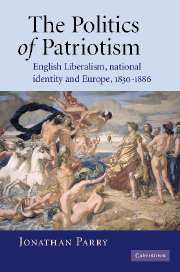Book contents
- Frontmatter
- Contents
- Acknowledgments
- Introduction
- PART I ENGLISH LIBERALISM AND NATIONAL IDENTITY
- PART II EUROPE AND LIBERAL POLITICS
- 3 Liberalism and the Continent, 1830–1847
- 4 The 1848 revolutions and the triumph of liberal patriotism
- 5 Italian unification and the search for an ethical nationhood
- 6 The Franco-Prussian War and the destruction of the first Gladstone government, 1870–1874
- 7 The Eastern question and its consequences, 1875–1886
- Conclusion: Liberalism, state and nation
- Abbreviations and select bibliography
- Index
5 - Italian unification and the search for an ethical nationhood
Published online by Cambridge University Press: 17 July 2009
- Frontmatter
- Contents
- Acknowledgments
- Introduction
- PART I ENGLISH LIBERALISM AND NATIONAL IDENTITY
- PART II EUROPE AND LIBERAL POLITICS
- 3 Liberalism and the Continent, 1830–1847
- 4 The 1848 revolutions and the triumph of liberal patriotism
- 5 Italian unification and the search for an ethical nationhood
- 6 The Franco-Prussian War and the destruction of the first Gladstone government, 1870–1874
- 7 The Eastern question and its consequences, 1875–1886
- Conclusion: Liberalism, state and nation
- Abbreviations and select bibliography
- Index
Summary
The years 1859 and 1868 were crucial in the history of the Liberal party. On both occasions the party rallied against a minority Conservative government, demonstrating in the process a degree of purpose and unity, and a range of support, that no Liberal government had been able to muster since the 1830s. In 1859 the immediate cause was Italy, in 1868 Ireland. The Italian issue associated the party with global strength and an international mission on behalf of constitutional, religious and commercial liberty. Success there appeared to represent a conclusive victory for English constitutional values in Europe over the forces of autocracy. The Conservatives could be presented as friends of oppression and clericalism, or at least too feeble in the struggle against these. In 1868 the Irish issue offered many of the same benefits for the party, and its significance is best appreciated in the light of the Italian debates. Different groups of Liberals welcomed the proposal to disestablish the Irish Church for different reasons, but with underlying agreement that – on analogous principles to the Italian case – it was the best route to the reassertion of British authority and values in Ireland against the twin ‘foreign’ threats of repressive papal clericalism and violent secular republicanism. Disraeli's alternative was unacceptably unpatriotic.
In a sense, therefore, the claim was that Italy and Ireland could be won for Britain, and this aspiration demonstrates the enormous national self-confidence of the decade.
- Type
- Chapter
- Information
- The Politics of PatriotismEnglish Liberalism, National Identity and Europe, 1830–1886, pp. 221 - 275Publisher: Cambridge University PressPrint publication year: 2006



